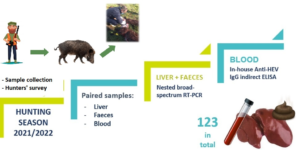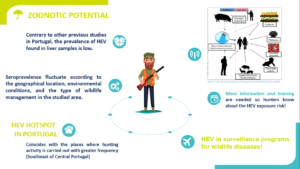Currently, the infection of European wild boars with the Hepatitis E virus (HEV) is seen as an emerging Public Health concern. Humans may be in danger of contracting acute lethal hepatitis from foodborne HEV infection since this is a significant zoonosis in this wild population. Additionally, it is also a risk factor for domestic pigs, particularly those raised outside. The majority of documented zoonotic cases are linked to eating raw or undercooked meat and/or liver.
A recent study conducted in Portugal by the working group of the University of Trás-os-Montes and Alto Douro, by Ana Carolina Abrantes and Prof. Madalena Vieira-Pinto, aims to determine the occurrence of HEV in the Portuguese wild boar population. Paired samples (blood, faeces, and liver) were taken from 123 hunted wild boars during the 2021–2022 hunting season. HEV-RNA was found in liver and faeces samples using an RT-PCR assay. An ELISA test was run on blood specimens.

Only one liver sample tested positive for faeces and HEV (0,8%). 34 sera in all (26.7%) tested positive for antibodies. In contrast to earlier research conducted in Portugal, there is a higher seropositivity but a lower prevalence of HEV in the liver and faeces. However, a more thorough analysis revealed the existence of a HEV hotspot in central Portugal’s southeast, which poses a zoonotic risk to local hunters.
Parallelly in this research, a survey on “game meat self-consumption and good hygiene practices”, three questions related to risk factors for zoonotic exposure to HEV were asked: “Do you usually consume the liver of the carcasses that you eviscerate and prepare?” and “If so, is there any possibility of consuming the liver undercooked?” and one other question about one tradition of Portuguese hunting activities named hunter’s baptism, “Have you ever seen a hunter’s baptism, the liver being rubbed on the hunter’s face?”. Of 106 hunters questioned, 21 assume that they consume the liver of wild boars (19.8%), but only three recognised the possibility of consuming it undercooked. Regarding the hunters’ baptism and the custom of applying raw liver to the face, 52 respondents (49%), 50 occasionally (47.2%), and the remainder 4 consistently (3.8%) said they had never witnessed this practice.
The study’s findings highlight how important it is to include HEV in Portuguese wildlife disease surveillance programs in order to increase the amount of data currently available and evaluate the disease’s potential zoonotic risk, especially for hunters and other stakeholders involved in the game industry. The authorities should prioritise informing hunters of this genuine zoonotic risk when consuming this kind of meat.

AUTHOR:
Ana Carolina Abrantes (PhD student and ECVPH resident; researcher at CECAV-UTAD): focuses on epidemiology and detection of zoonotic agents in the wild game species in Portugal and its reproaches to Public Health.
ARTICLE REFERENCE: Abrantes, A. C., Santos-Silva, S., Mesquita, J., & Vieira-Pinto, M. (2023). Hepatitis E Virus in the Wild Boar Population: What Is the Real Zoonotic Risk in Portugal?. Tropical Medicine and Infectious Disease, 8(9), 433. https://doi.org/10.3390/tropicalmed8090433

